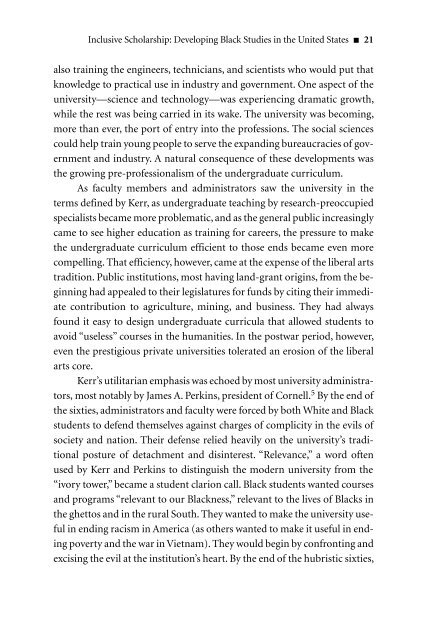Inclusive Scholarship: Developing Black Studies - Ford Foundation
Inclusive Scholarship: Developing Black Studies - Ford Foundation
Inclusive Scholarship: Developing Black Studies - Ford Foundation
Create successful ePaper yourself
Turn your PDF publications into a flip-book with our unique Google optimized e-Paper software.
<strong>Inclusive</strong> <strong>Scholarship</strong>: <strong>Developing</strong> <strong>Black</strong> <strong>Studies</strong> in the United States 21<br />
also training the engineers, technicians, and scientists who would put that<br />
knowledge to practical use in industry and government. One aspect of the<br />
university—science and technology—was experiencing dramatic growth,<br />
while the rest was being carried in its wake. The university was becoming,<br />
more than ever, the port of entry into the professions. The social sciences<br />
could help train young people to serve the expanding bureaucracies of government<br />
and industry. A natural consequence of these developments was<br />
the growing pre-professionalism of the undergraduate curriculum.<br />
As faculty members and administrators saw the university in the<br />
terms defined by Kerr, as undergraduate teaching by research-preoccupied<br />
specialists became more problematic, and as the general public increasingly<br />
came to see higher education as training for careers, the pressure to make<br />
the undergraduate curriculum efficient to those ends became even more<br />
compelling. That efficiency, however, came at the expense of the liberal arts<br />
tradition. Public institutions, most having land-grant origins, from the beginning<br />
had appealed to their legislatures for funds by citing their immediate<br />
contribution to agriculture, mining, and business. They had always<br />
found it easy to design undergraduate curricula that allowed students to<br />
avoid “useless” courses in the humanities. In the postwar period, however,<br />
even the prestigious private universities tolerated an erosion of the liberal<br />
arts core.<br />
Kerr’s utilitarian emphasis was echoed by most university administrators,<br />
most notably by James A. Perkins, president of Cornell. 5 By the end of<br />
the sixties, administrators and faculty were forced by both White and <strong>Black</strong><br />
students to defend themselves against charges of complicity in the evils of<br />
society and nation. Their defense relied heavily on the university’s traditional<br />
posture of detachment and disinterest. “Relevance,” a word often<br />
used by Kerr and Perkins to distinguish the modern university from the<br />
“ivory tower,” became a student clarion call. <strong>Black</strong> students wanted courses<br />
and programs “relevant to our <strong>Black</strong>ness,” relevant to the lives of <strong>Black</strong>s in<br />
the ghettos and in the rural South. They wanted to make the university useful<br />
in ending racism in America (as others wanted to make it useful in ending<br />
poverty and the war in Vietnam). They would begin by confronting and<br />
excising the evil at the institution’s heart. By the end of the hubristic sixties,

















